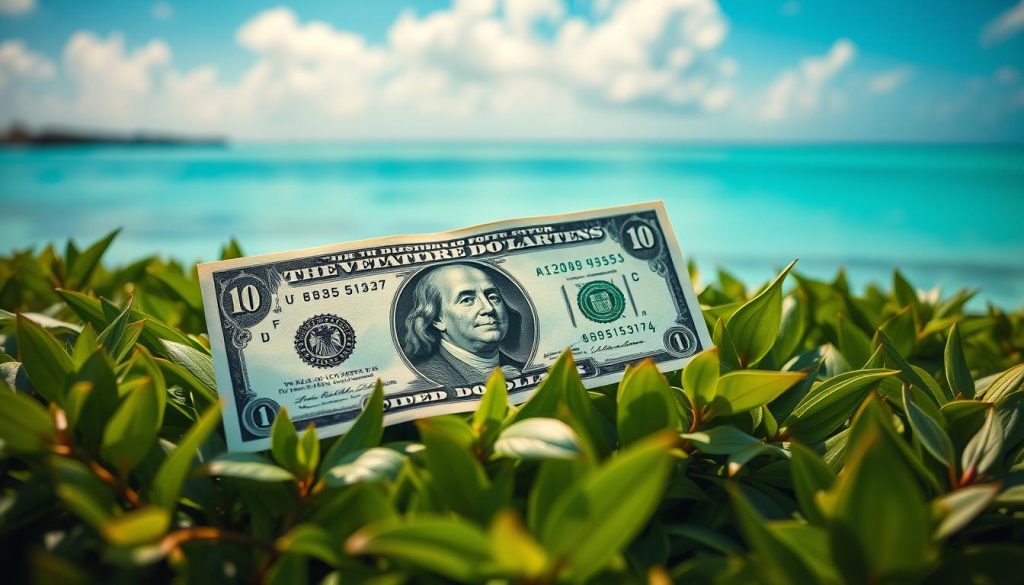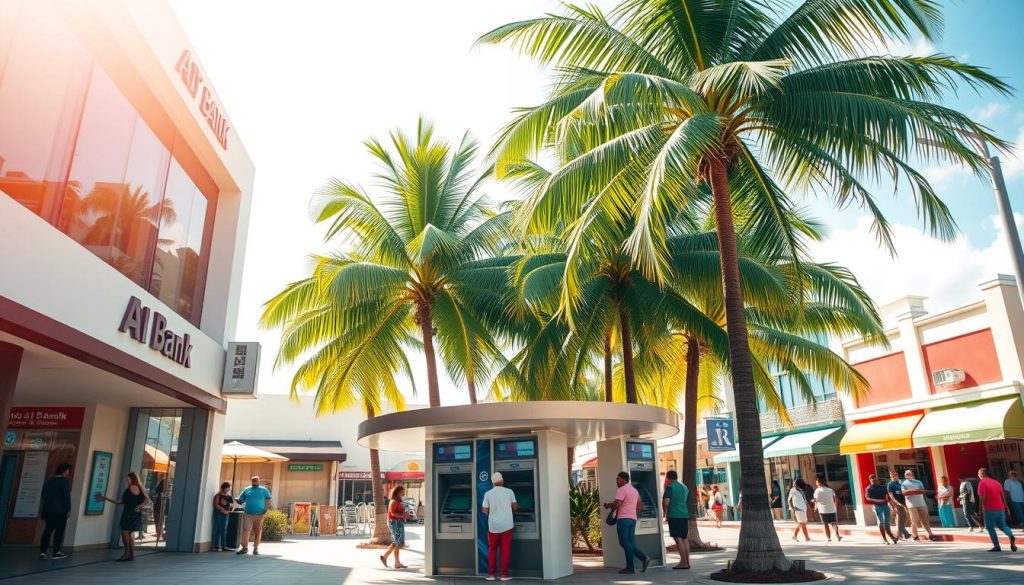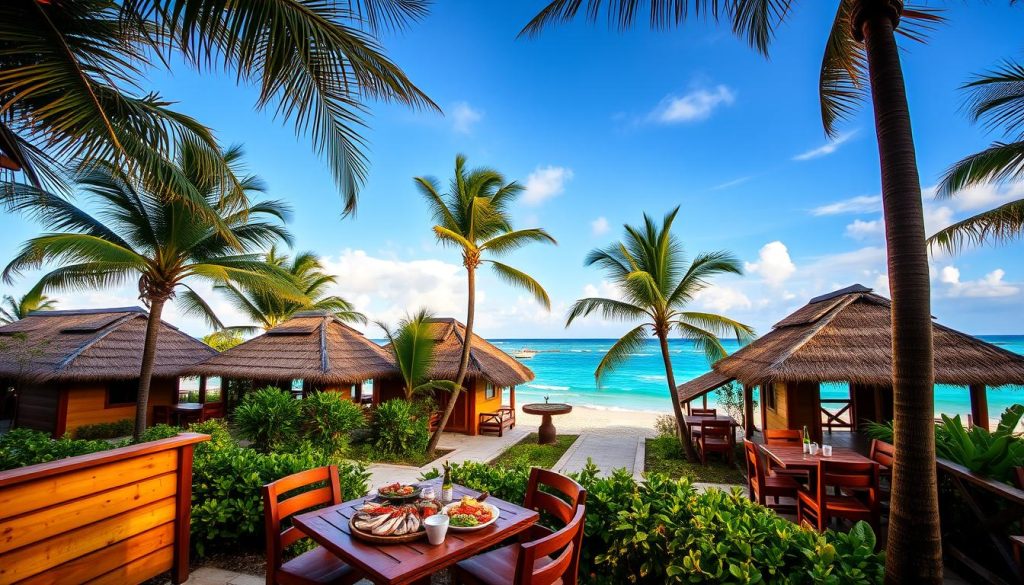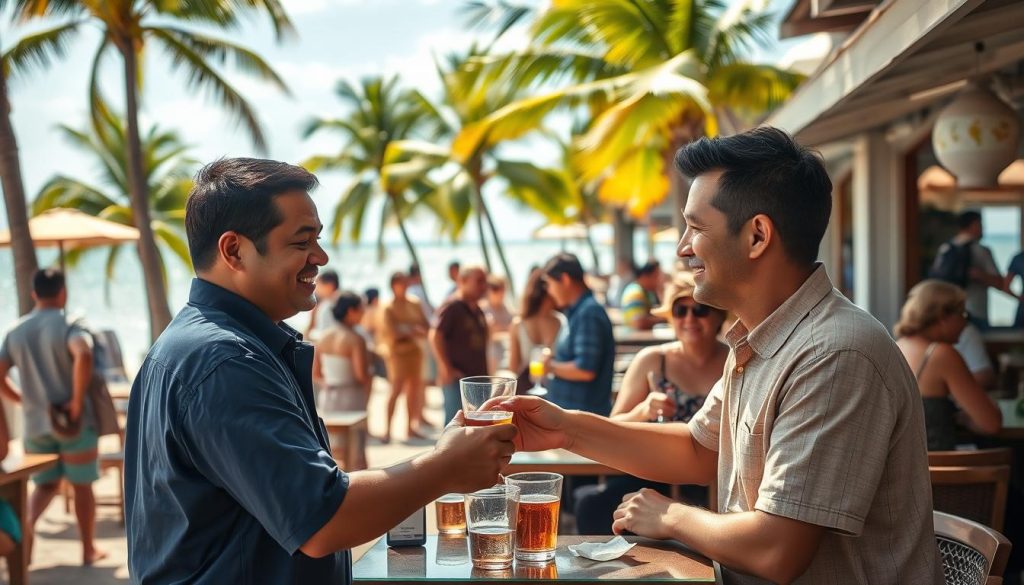Did you know that Palau, a remote island nation in the Pacific, uses the US dollar as its official currency? This makes it easier for U.S. visitors to manage their money while exploring its pristine marine life and rich cultural heritage.
Understanding how to handle payments is crucial for a smooth trip. Whether you’re using cards or cash, knowing the basics can save you time and hassle. Most businesses accept major credit and debit cards, but having some cash on hand is always a good idea.
This guide is designed to help you navigate the financial aspects of your journey. From banking services to budgeting tips, you’ll learn everything you need to make your travel experience seamless. Let’s dive into the essentials of managing your dollar in this breathtaking destination.
Introduction to Currencies & Payments in Palau
Managing your money effectively starts the moment you land at the airport. Understanding how payments work in this island nation ensures a smooth and enjoyable trip. From your arrival to everyday transactions, knowing the basics can save you time and hassle.
Most businesses accept major credit and debit cards, but carrying some cash is always a good idea. This is especially true for smaller shops or local markets. Some places may charge a small fee for card payments, so having cash on hand can help you avoid extra costs.
For example, when dining at a restaurant, you’ll find that tipping is not expected. However, adding 10% for exceptional service is appreciated. This small gesture can enhance your experience while respecting local customs.
Here’s a quick overview of payment options you’ll encounter:
| Payment Method | Where It’s Accepted | Tips |
|---|---|---|
| Cash | Markets, small shops, taxis | Keep small bills for convenience |
| Credit/Debit Cards | Hotels, restaurants, larger stores | Check for transaction fees |
| Mobile Payments | Limited availability | Confirm with the vendor beforehand |
By understanding these payment systems, you’ll be well-prepared for your journey. The next sections will dive deeper into banking, exchange strategies, and more to help you make the most of your trip.
The Historical and Cultural Backdrop of Palau
The history of this island nation is a fascinating blend of ancient traditions and colonial influences. From its early days as a home to indigenous communities to its encounters with European powers, the story of this country is rich and diverse. Understanding this backdrop adds depth to your visit and helps you appreciate its unique charm.
Ancient History and European Influence
Long before colonial powers arrived, this country was home to thriving villages and a vibrant culture. The Spanish were the first Europeans to arrive in the 16th century, followed by the Germans in the 19th century. Each colonial period left its mark, from architecture to administrative systems.
During the early 20th century, Japanese influence brought significant changes, including infrastructure development. After World War II, American administration further shaped the modern systems you see today. This layered history is evident in landmarks and cultural practices.
Cultural Traditions and Local Customs
The cultural heritage of this island is preserved in its traditional Bai meeting houses and intricate storyboards. These structures are not just tourist attractions but also symbols of community and storytelling. Visiting a local village offers a glimpse into daily life and customs that have endured for centuries.
Museums and cultural centers play a vital role in safeguarding this history. They showcase artifacts, art, and stories that connect the past to the present. Exploring these spaces enriches your understanding of the country’s identity.
From ancient traditions to colonial legacies, the history and culture of this destination shape its modern systems and tourist experiences. Whether you’re shopping for local crafts or visiting a museum, you’ll find that the past is always present.
Official Currency in Palau: The US Dollar
The US dollar is the official currency in this Pacific island nation, making transactions straightforward for visitors. This eliminates the need for currency exchange, saving you time and effort during your trip. Whether you’re shopping, dining, or exploring, you’ll find the dollar widely accepted.
This arrangement stems from the Compact of Free Association with the United States. It ensures financial stability and consistency, which is particularly beneficial for travelers. You won’t have to worry about fluctuating exchange rates or hidden fees when budgeting for your trip.

Understanding prices and costs is simple here. For example, a snorkeling excursion typically costs around $80, while a meal at a local restaurant averages $20. These consistent pricing practices make it easy to plan your expenses without surprises.
Here’s a quick overview of common costs you might encounter:
| Activity/Item | Average Cost (USD) |
|---|---|
| Snorkeling Excursion | $80 |
| Meal at a Local Restaurant | $20 |
| Daily Car Rental | $40 |
| Budget Hotel Room (Per Night) | $45 |
Using the US dollar also streamlines shopping and dining experiences. Most establishments accept cash, and many larger businesses take credit cards. This convenience ensures you can focus on enjoying your trip rather than worrying about financial logistics.
Payment Options for Your Trip
Exploring the island’s vibrant markets and eateries is easier when you know the best ways to pay. Whether you’re shopping for souvenirs or enjoying a meal, understanding local payment methods ensures a smooth experience.
Local Payment Methods at Shops and Restaurants
Cash is king in smaller shops and local markets. Many vendors prefer it, especially for smaller purchases. Carrying small bills is a smart move, as it makes transactions quicker and avoids the hassle of change.
At restaurants, tipping isn’t expected but is appreciated for exceptional service. Adding 10% is a thoughtful gesture. Some places may charge a small fee for card payments, so having cash on hand can save you extra costs.
Using Credit and Debit Cards on the Go
For larger purchases or activities like diving excursions, cards are widely accepted. Most hotels, restaurants, and larger stores take major credit and debit cards. However, it’s always good to confirm beforehand, especially in remote areas.
Here are a few tips for using cards:
- Check for transaction fees, as some businesses may add a small charge.
- Inform your bank about your travel plans to avoid card blocks.
- Keep a mix of cash and cards to cover all payment scenarios.
By understanding these options, you’ll be well-prepared to enjoy your trip without worrying about payments.
Currency Exchange Strategies and Rates
Understanding currency exchange strategies can save you time and money. Whether you’re traveling for business or leisure, getting the best rates ensures your money goes further. Start by exchanging currency at banks or authorized outlets, as they typically offer competitive rates and lower fees.
Avoid exchanging money at airports or hotels. These places often charge higher fees and provide less favorable rates. Instead, plan ahead and use online tools or apps to access real-time exchange information. Platforms like Wise or XE can help you track rates and make informed decisions.
Comparing rates is essential. Even small differences can add up, especially for larger transactions. Keep track of your ticket and transaction details to ensure accuracy. This level of preparation can help you avoid unnecessary costs and maximize your budget.
In some cases, using a card may be more convenient than carrying cash. Many travel cards offer competitive exchange rates and low fees for international transactions. However, always check for hidden charges and inform your bank about your travel plans to avoid disruptions.
By following these strategies, you can make the most of your finances while traveling. A little preparation goes a long way in ensuring a smooth and cost-effective trip.
Banking, ATMs, and Financial Services
Accessing financial services during your trip is simple and convenient. The island offers a reliable number of ATMs and banks to assist with your transactions. Most ATMs are located in Koror, the main commercial hub, and are operated by institutions like the Bank of Hawaii and Bank of Guam.
Using your card is easy, as most ATMs accept major international networks like Visa and Mastercard. However, it’s wise to inform your bank about your travel plans to avoid any disruptions. Some ATMs may charge a small fee, so checking with your bank beforehand can save you extra costs.

Banking hours typically run from 9 AM to 3 PM on weekdays, with limited services on weekends. For urgent needs, some ATMs operate 24/7, ensuring you can access cash whenever required. Always choose secure locations, such as those inside banks or well-lit areas, for your transactions.
When it comes to transportation, having cash on hand is essential. While some taxis and shuttle services accept cards, smaller operators may prefer cash. Coordinating your banking needs with your travel plans ensures a smooth experience.
Here’s a quick overview of banking services and ATM locations:
| Service | Location | Tips |
|---|---|---|
| ATMs | Koror, Peleliu | Check for fees and inform your bank |
| Banking Hours | 9 AM – 3 PM (Weekdays) | Plan ahead for weekend needs |
| Card Usage | Hotels, restaurants, larger stores | Carry cash for smaller vendors |
By understanding these services, you can manage your finances effectively and focus on enjoying your trip.
Managing Cash vs. Card Payments
Balancing cash and card payments can make your daily transactions smoother and more efficient. Each method has its advantages, and understanding when to use which can save you time and hassle during your trip.
Cash is often preferred by smaller vendors, local markets, and transportation services. It’s quick, straightforward, and avoids potential card fees. Carrying smaller bills is especially useful for quick snacks or tipping.
On the other hand, cards are widely accepted in hotels, restaurants, and larger stores. They’re convenient for bigger purchases and offer security against loss or theft. However, some places may charge a small fee for card transactions, so it’s wise to check beforehand.
| Payment Method | Best For | Tips |
|---|---|---|
| Cash | Small purchases, local markets, transportation | Keep small bills for convenience |
| Card | Hotels, restaurants, larger stores | Check for transaction fees |
Carrying a mix of both ensures you’re prepared for any situation. For example, using cash for a quick street food purchase can save time, while a card is ideal for booking a day-long excursion.
Budgeting your money effectively involves planning for both methods. Allocate a daily amount for cash expenses and keep your card for larger or unexpected costs. This approach helps you stay organized and enjoy your trip without financial stress.
By balancing cash and card payments, you’ll navigate your daily needs with ease and focus on making the most of your journey.
Maximizing the Benefits of Travel Debit Cards
Travel debit cards are a game-changer for managing finances abroad. They simplify transactions, reduce fees, and provide security for your money. Whether you’re exploring bustling cities or remote islands, these cards ensure a smooth financial experience.
Advantages of Multi-Currency Cards
Multi-currency cards, like the Wise card, are designed for international travelers. They allow you to hold and convert multiple currencies at real-time rates. This eliminates the need for constant currency exchange and saves you from hidden fees.
Here are some key benefits:
- Lower Fees: Avoid high exchange rates and transaction charges.
- Immediate Conversion: Convert currencies instantly at the mid-market rate.
- Security: Protect your money with features like PIN protection and fraud alerts.
Setup and Best Practices
Setting up your travel debit card in advance ensures a hassle-free trip. Start by choosing a card that suits your needs, such as one with fee-free withdrawals or multi-currency support. Activate it before departure and load it with the currencies you’ll need.
Follow these best practices:
- Inform Your Bank: Notify your bank about your travel plans to avoid card blocks.
- Monitor Spending: Use dedicated apps to track transactions and manage your account.
- Carry Backup: Keep a mix of cash and cards for emergencies.
For example, the Wise card offers up to £200 in fee-free withdrawals per month, making it ideal for budget-conscious travelers. By using these cards, you can focus on enjoying your trip without worrying about financial logistics.
| Feature | Benefit |
|---|---|
| Multi-Currency Support | Hold and convert multiple currencies at real-time rates |
| Low Fees | Save on exchange and transaction charges |
| Security Features | Protect your money with PIN and fraud alerts |
By leveraging the benefits of travel debit cards, you can enhance your travel experience and manage your finances with ease. Plan in advance, stay informed, and enjoy a stress-free journey.
Budgeting for Accommodation and Dining
Planning your stay and meals wisely can make your trip both enjoyable and affordable. Finding the right balance between comfort and cost ensures you get the most out of your travel experience without overspending.
When choosing accommodation, compare options to find the best value. Budget-friendly hotels and hostels are widely available, with prices averaging under $100 per night. For a more local experience, consider Airbnb rentals, which can be as low as $19 per night in some areas.

- Book in advance: Early reservations often secure lower rates and better availability.
- Compare prices: Use online platforms to check multiple options and read reviews.
- Consider location: Staying slightly outside the main tourist areas can save money without sacrificing convenience.
Dining out doesn’t have to break the bank. Local restaurants offer delicious meals at reasonable prices, with dishes averaging $5 to $6. For a quick bite, try bento boxes, which cost just $2 to $3. Balancing meals between street food and sit-down restaurants helps stretch your budget further.
Here’s how to make the most of your dining experience:
- Explore local cuisine: Opt for dishes that showcase regional flavors without the high price tag.
- Ask for recommendations: Locals often know the best spots for affordable and authentic meals.
- Plan meals ahead: Knowing where and what you’ll eat helps avoid impulse spending.
By planning ahead and making informed choices, you can enjoy your trip without worrying about unexpected costs. Smart budgeting ensures you get the best value while experiencing all the destination has to offer.
Transportation and Payment Solutions
Getting around the island is easy with a variety of transportation options to suit your needs. Whether you prefer the convenience of a taxi, the flexibility of a rental car, or the freedom of a scooter, there’s something for everyone. Understanding these choices helps you plan your journey efficiently.
In urban areas, taxis are readily available and provide a hassle-free way to explore the city. They’re ideal for short trips or when you’re unfamiliar with the area. However, fares can add up quickly, so it’s wise to agree on a price before starting your ride.
For more independence, renting a car or scooter is a great option. Rental cars are perfect for longer trips or exploring remote areas, while scooters offer a fun and economical way to navigate. Keep in mind that driving conditions may vary, so always prioritize safety.
When planning your flight and airport transfers, consider your location and schedule. Many hotels offer shuttle services, and private transfers can be booked in advance. This ensures a smooth transition from the airport to your accommodation.
Here’s a quick comparison of transportation options:
| Option | Pros | Cons |
|---|---|---|
| Taxi | Convenient, no parking hassles | Higher cost for long distances |
| Rental Car | Flexibility, ideal for remote areas | Requires driving experience |
| Scooter | Economical, easy to park | Limited to short distances |
To access reliable transportation, research local providers and read reviews. Booking in advance can save time and ensure availability. Whether you’re in the city or exploring off-the-beaten-path locations, these tips will help you move around with ease.
Palau: Ultimate Travelers Guide to Currencies & Payments
Planning your finances for a trip to this Pacific destination is easier than you might think. This guide is designed to be your one-stop resource for managing your money efficiently while exploring the area. From understanding payment options to budgeting strategies, we’ve covered everything you need to know.
One of the key takeaways is the convenience of using the US dollar as the official currency. This eliminates the need for currency exchange and simplifies transactions. Whether you’re shopping, dining, or booking activities, you’ll find the dollar widely accepted across the country.
| Topic | Key Insights |
|---|---|
| Payment Options | Cash is preferred in local markets, while cards are widely accepted in hotels and larger stores. |
| Currency Exchange | Exchange at banks for better rates and avoid high fees at airports or hotels. |
| Banking Services | ATMs are available in Koror, and most accept major international cards. |
| Budgeting Tips | Plan ahead for accommodation, dining, and transportation to avoid unexpected costs. |
Being informed about these financial aspects ensures a smoother and more enjoyable trip. If you have specific questions, revisit the relevant sections for detailed insights. For example, the section on transportation provides tips for getting around efficiently, while the banking section offers advice on accessing ATMs and managing cash.
Remember, preparation is key. By understanding payment options, exchange rates, and budgeting strategies, you can focus on enjoying your journey without financial stress. This guide is here to help you make the most of your time in this beautiful destination.
Money Management Tips for Travelers
Effective money management is key to a stress-free travel experience. Keeping track of your daily expenses and avoiding hidden fees can make your trip more enjoyable and budget-friendly. Here are some practical tips to help you stay on top of your finances.
Tracking Daily Expenses
Start by recording every transaction, no matter how small. This helps you monitor your spending and prevents overspending. Use mobile apps like Trabee Pocket or Splittr to track your expenses in real-time. These tools categorize your costs, making it easier to see where your money goes each day.
Another useful tip is to set a daily budget. Allocate funds for essentials like meals and transportation, and leave room for small indulgences. This balance ensures you enjoy your trip without breaking the bank.
Avoiding Hidden Fees
Hidden fees can quickly add up, especially when using ATMs or exchanging currency. Always check for transaction fees and service charges before making a withdrawal. Banks and ATMs inside hotels or banks often have lower fees compared to street ATMs.
When using credit or debit cards, inform your bank about your travel plans to avoid blocks. Also, consider using travel-friendly cards like Starling Bank or Revolut, which offer low or no fees for international transactions.
By staying vigilant and planning ahead, you can save time and money, ensuring a smoother and more enjoyable journey.
Digital Tools for Real-Time Currency Conversion
Staying on top of currency exchange rates is easier than ever with digital tools. These apps provide real-time information, helping you make informed decisions while on the go. Whether you’re budgeting for meals or booking activities, these tools ensure you get the best rates.
Smartphone apps like Wise and XE are game-changers for travel. They offer live exchange rates and conversion alerts, so you always know the current value of your money. This helps you avoid overpaying by comparing rates instantly.
Here’s why these apps are so useful:
- Real-time updates: Get the latest exchange rates at your fingertips.
- Transaction monitoring: Track your spending and conversions in one place.
- Fee transparency: Avoid hidden charges with clear breakdowns.
Setting up these apps before your trip is a smart move. Download them, load your preferred currencies, and you’re ready to go. For example, Wise allows you to hold multiple currencies and convert them at mid-market rates, saving you time and money.
“Digital tools simplify complex currency conversions, making travel finances stress-free.”
By using these apps, you can focus on enjoying your journey without worrying about financial logistics. They’re a must-have for any traveler looking to streamline their money management.
Safety Guidelines for Handling Money
Ensuring the safety of your money while traveling is essential for a stress-free experience. Whether you’re exploring bustling markets or relaxing in remote areas, taking precautions can protect your finances and give you peace of mind.
Secure Storage Practices
One of the best ways to safeguard your cash and cards is by using secure storage options. Hotel safes are a reliable choice for keeping valuables during your stay. For added security, consider using RFID-blocking wallets to protect your cards from electronic theft.
When carrying money, divide it into multiple locations. Keep a small amount in your wallet for daily expenses and store the rest in a hidden pouch or money belt. This ensures you always have access to funds without risking everything at once.
Awareness of Pickpocketing Risks
Pickpocketing can happen in crowded areas or during nighttime activities. Stay alert by keeping your belongings close and avoiding distractions. In busy places, wear your bag in front of you and keep zippers secured.
Here are some additional tips to stay vigilant:
- Avoid displaying large sums of cash in public.
- Use ATMs in well-lit areas or inside banks, and cover the keypad when entering your PIN.
- Be cautious of strangers offering unsolicited help or service.
If you suspect financial fraud or theft, act quickly. Contact your bank to block your cards and report the incident to local authorities. Having a backup plan, such as a secondary card or emergency number, can save you from being stranded without funds.
“Staying prepared and aware is the key to protecting your money while traveling.”
By following these guidelines, you can minimize risks and focus on enjoying your trip. A little planning goes a long way in ensuring your financial safety.
Insider Tips: Navigating Fees and Tipping Customs
Understanding local customs around fees and tipping can make your trip smoother. Whether you’re dining out or staying at a hotel, knowing the norms ensures respectful and hassle-free interactions.

Tipping Etiquette at Restaurants and Hotels
In restaurants, tipping isn’t mandatory but is appreciated for exceptional service. Adding 10% of the bill is a thoughtful gesture. For casual dining, rounding up the bill or leaving a small amount is common.
At hotels, tipping staff like bellhops or housekeeping is a kind way to show appreciation. A few dollars per service is standard. Always check if a service charge is already included to avoid double-tipping.
Here’s a quick guide to tipping practices:
- Restaurants: 10% for exceptional service.
- Hotels: $1-$2 per bag for bellhops, $2-$5 daily for housekeeping.
- Taxis: Round up the fare or add 10% for good service.
When it comes to fees, some businesses may charge a small fee for using a card. Always ask beforehand to avoid surprises. Carrying cash for smaller transactions can help you bypass these charges.
By mastering these customs, you’ll navigate your transactions with ease and respect. A little preparation goes a long way in enhancing your travel experience.
Conclusion
Exploring a new place becomes effortless when you’re well-prepared with the right financial tools. This guide has provided essential information on managing your money, from using cash and cards to leveraging digital tools for real-time conversions. By combining these methods, you can ensure a smooth and stress-free travel experience.
Being informed saves you time and helps you avoid unnecessary hassles. Use this guide as a checklist to plan your financial transactions before and during your trip. Whether you’re navigating a bustling village or relaxing in a serene spot, preparation is key to enjoying every moment.
Thank you for reading! Revisit the sections for detailed advice as needed. With the right knowledge, you can explore with confidence and ease, making the most of your journey. Happy travels!
The above is subject to change.
Check back often to TRAVEL.COM for the latest travel tips and deals.






0 Comments